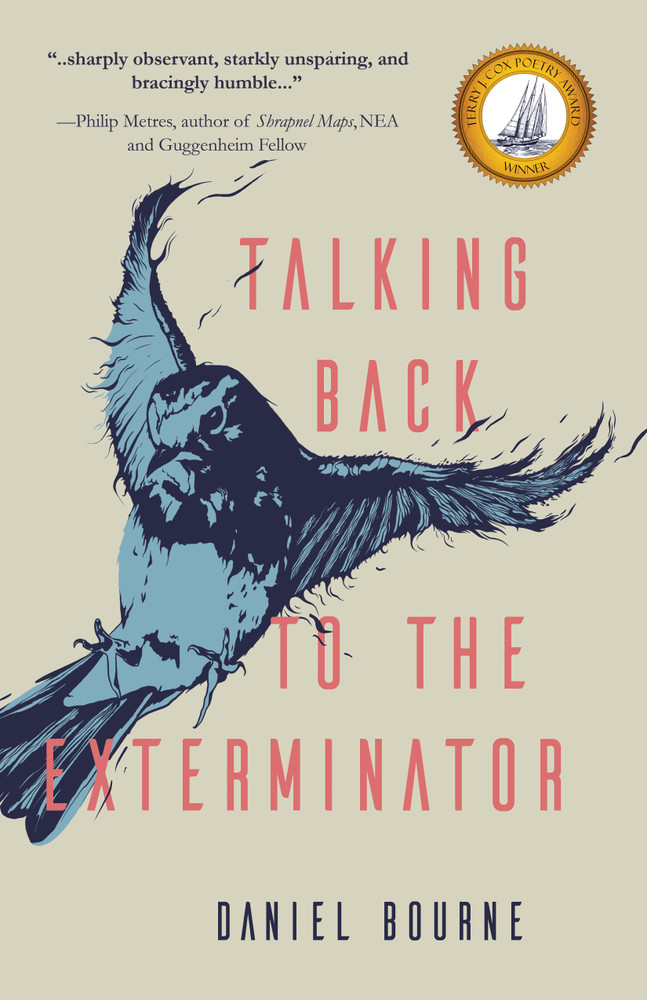Talking Back to the Exterminator
Regal House Titles- Current Stock:
- 0
- SKU:
- TBTE24
Poems, like politics, can be local and global, personal and cultural. In Daniel Bourne’s Talking Back to the Exterminator, we see this interplay at work in these ruminations on place—our connections and disconnections to it—from Bourne’s upbringing in southern Illinois to his later homes in Ohio, Poland, or the American Southwest. This connection certainly involves a sense of celebration, but also of anxiety and tension in realizing the fragility and impermanence of both self and surroundings. Yet, despite the opportunity as well as the challenge of memory—the way it is continually erased yet also continues to scribble in the brain—these poems also bear witness to how we push back against all the “exterminations” in our lives.
Praise for Talking Back to the Exterminator
“Ezra Pound asked for a poetry ‘austere, direct, free from emotional slither,’ poetry ‘harder and saner’ than the usual fare of his day. I thought of this several times while reading, and being struck hard by, Daniel Bourne’s Talking Back to the Exterminator. But how is it, I kept wondering, too, that such unrelenting poems wherein even light is smoke, and children are murdered, and ‘any second you can be struck dumb,’ and memory is an ‘exposed metal’ that rusts, and monsters haunt us within harrowing experiences of family members, that there can still be…beauty? Or maybe sublimity is the right word, with the sublime’s indwelling dimension/stain of darkness? The horror and beauty of, just to name two of many poems, ‘Still Life With Susan, the Killbuck Marsh’ near the beginning and ‘Magnolia Winter’ near the end are stunning. This whole substantial collection is unified by Bourne’s austere (that realistic and cautioning word again) descriptive power and his refusal to look away, not to evade what has wounded him and wounds us into the poetry of his and our lives.”
—William Heyen, National Book Award finalist for Shoah Train, author of Nature: Selected & New Poems 1970-2020
“In Daniel Bourne’s Talking Back to the Exterminator, the creatures of the earth are taken on as celebration, rather than menace, where ‘bees start to walk/ across the scratched wax of the table…’ Bourne is an excellent eco-poet whose poems include—just to name a few—snapping turtles, pheasants, orioles, the extinct Aurochs, groundhog, cows, frogs carpenter ants, locusts, slugs, skunks, mosquitoes, ticks, and fleas, not to mention ‘Great auk. Heath hen. Akialoa./ Passenger pigeon.// Bachman’s warbler. Carolina parakeet./Labrador duck.” Bourne’s poetry is also rooted in place and memory, in such riveting poems as ‘Autobiography with Line-Breaks,’ while others remember toy guns and spit baths. He is a poet who writes out of the personal but whose astute gaze is outward towards the world, towards our perilous future. Talking Back to the Exterminator is an extraordinary collection.”
—Denise Duhamel, author of Scald (2017), and Blowout (2013), finalist for a National Books Critics Circle Award
“In Talking Back to the Exterminator, Daniel Bourne finds himself in the liminal spaces, between humanity and nature, city and country, present and past, the living and the dead. In poems by turn sharply observant, starkly unsparing, and bracingly humble, Bourne draws these realms closer. This scion of farmers, this longtime sojourner of language, furrows these pages with the plowshare of poetry: ‘On the page, the farm can flourish./On the page, my dad still lives.’”
—Philip Metres, author of Shrapnel Maps,NEA and Guggenheim Fellow
“Daniel Bourne situates us among a world of near and far neighbours, and of ancestors moving from Ohio to Illinois for over a century before his ‘returning’ to Ohio and making it his home. In this book of intense localism fused with journeys away and journeys (even if he ponders ‘Against Travel’ and the depths of staying home) into the interior of land, family, and the stories around these, we receive an intense dose of the rural, the natural world, and what threatens it externally and internally. But if the local world is at the core of Bourne’s sensibility, then its peripheries are diverse, from the world and works of Borges and tea ceremonies to developed considerations of signs and works elsewhere. There’s a powerful series of childhood evocations, and renderings of historical moments, often immersed in a tension between locals and the natural world. But there is a generous infusion of swamp deer and cardinals, of animals, plants, and birds amidst the vulnerability of a world on the edge. Violence, extinction, and loss threaten the familiar, and the familiar is imbued with an anxiety about its presence. A poem can move from celebratory observation to deep scrutiny in a moment. The familiar so often contains the unexpected.
—John Kinsella, author of Peripheral Light: New and Selected Poems (Norton), editor of the Penguin Anthology of Australian Poetry, founding editor of the literary journal Salt, and former international editor of the Kenyon Review
“Daniel Bourne’s Talking Back to the Exterminator sifts through layers of both smallness and occasional grandeur—insects, birds, isolated people dotted about a dusty landscape toiling until they die, the stories of Borges, the teachings of Jesus. Who are we at our center and how are we alike? the poems inquire through trails of velvet ants and lost dogs and bad weather that gets inside the house. ‘I don’t want to speak too fancy here but this bird is an artist,’ we are told about juncos after a thunderstorm, and this is the reliable magic of these poems: the comfort and insight they pass gently to the reader without making a big deal about it. I will return to this book often to be reminded how to imagine the world from the inside out.”
—Lisa Lewis, editor Cimarron Review, NEA Fellow, and author of Silent Treatment (Viking/Penguin), National Poetry Series Award-Winner

